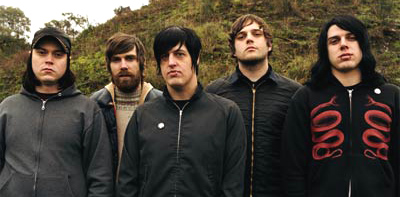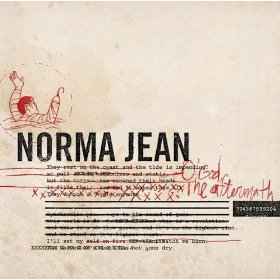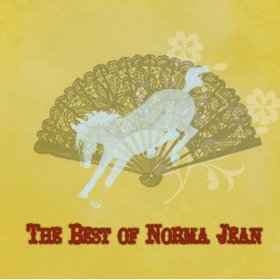Norma Jean was formed in Douglasville, Georgia (a suburb of Atlanta), in 1997. In the early 2000s, the band recorded two CDs as Luti-Kriss. The first was the EP 5 (which came out on the Pluto label), and that disc was followed by the full-length album Throwing Myself, which came out on the Seattle-based Solid State label (a subsidiary of Tooth and Nail Records) in 2001. After that album, Luti-Kriss changed its name to Norma Jean.
Released by Solid State in 2002, Bless the Martyr and Kiss the Child was the former Luti-Kriss' first album as Norma Jean. While Norma Jean's first recordings inspired comparisons to Limp Bizkit, Korn, (hed) p.e., and Methods of Mayhem, Bless the Martyr and Kiss the Child was often compared to Hatebreed. The group followed that up with O God, the Aftermath released in 2005.
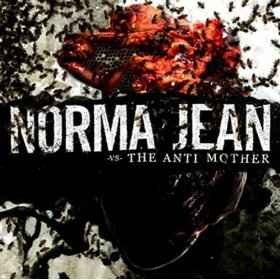
|
From the math-metal madness of "Muderotica" to the mesmerizing melodicism (wait, is that singing?) of "Bayonetwork", O' God, The Aftermath spans the chaotic cannon of heavy music from Pantera to Poison. O God's thematic lyrics, song titles and artful aesthetics are all open to interpretation-even the album's seemingly bleak title isn't necessarily what it appears to be. "A lot of people think the word 'aftermath' has a negative connotation, but I look at it as more of a positive thing; a pleasant aftermath, you could say," explains band drummer Davison. "It's looking at it from a spiritual standpoint; the aftermath of grace or salvation."
Produced by Ross Robinson (At The Drive-in, From First To Last, Sepultura), the band's album Redeemer, released in 2006, is at once the heaviest and most personal album in this band¹s arsenaland that¹s saying something. |
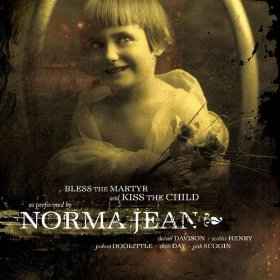 |
“Basically, we had too much material brewing inside us, and we wanted to get it out,” says drummer Daniel Davison, laughing. “We probably could’ve waited to record until after we cut back on what we had, but when the opportunity to work with Ross came up, it just felt like, ‘Man, being in the studio with this guy is something I’ve wanted to do since I was 12 years old; I’m gonna do anything I can to make this happen now.”
After practicing, in Davison’s recollection, “pretty much ever day, for about 50 days solid,” and going through rigorous pre-production at home in Atlanta, the band decamped with Robinson to Radio Star Studios in the tiny mountain town of Weed, California, to start work on Redeemer. Though some of the songs were still works-in-progress (as vocalist Cory Brandan recalls it, “Songs were changing up until 20 minutes before we tracked them”) the lyrics, again written collaboratively by Brandan, Henry and Davison, really took shape once the band got into the studio.
While rehearsals took place in a beautiful, open-stage environment inside the studio, tracking itself was another story—all part of the intense process that would eventually shape the songs. “I tracked my drums under the stage,” Davison remembers, laughing. “We’d get done talking about the song, and then we’d head down below the stage into, like, this little dungeon. It was really small, and the drums were set up with mikes all over them; there were hot water pipes, ventilation, everywhere—it was really intense. We could barely stand up because the ceiling was so low, but Ross was there the whole time, coaching us and keeping us in that mindset.”
Just one listen to the critically revered Redeemer (rightfully dubbed “explosive” by Metal Edge and “menacing” by Revolver) confirms the ferocity of the band’s performances. From the discordant breakdowns and jarring time changes of “The End Of All Things Will Be Televised” to the newfound melodic intensity of “Blueprints For Future Homes,” for which the group crafted a marvelously thrashing video, and “Songs Sound Much Sadder,” the video for which Norma Jean is about to debut to great anticipation, the album packs some of Norma Jean’s most unhinged, soul-baring playing into the span of 11 songs. And though the weird angles and difficult guitar figures that comprised Aftermath are still prevalent, that album’s refined, very-much-studio feel has given way to raw atmospheres in which you can practically see the sweat running onto the instruments. Brandan, who’s already proved himself a formidable vocalist, fully comes into his own on Redeemer with a style that veers between unhinged screaming and down-on-his-knees melodic belting.
As has been the case with Norma Jean’s previous albums, fans will interpret Redeemer’s title in a number of ways: There’s the obvious (it’s their shortest album title ever); the semi-obvious (the band members are Christian; the album’s called Redeemer—you follow?); and the not-so-obvious (look up “Redeemer” in Webster’s Dictionary for even more possibilities). All of these, says Davison, are valid readings, but as before, it’s better just to listen to the whole album before settling on an opinion about what it all means.
“We just wanted a title that was short and simple, but also really powerful,” Davison explains. “‘Redeemer’ was the most powerful word we could think of, and obviously, for us, being a spiritual band, it takes on special meaning.” vocalist Cory Brandan agrees. “We didn’t call it Redeemer and then try to make the lyrics work around that [idea],” he says. “There’s some really personal stuff on this record, and even though I’m seeing in hindsight that the title ties into some of that, I’ve always thought it’s best just to let people come up with their own ideas about the songs, rather than say, ‘This is our concept; this is what the record’s about.”



